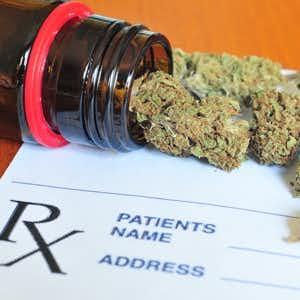
People with Alzheimer’s disease frequently become distressed and agitated. Nursing homes may try to control this behavior with antipsychotic drugs such as aripiprazole (Abilify), haloperidol (Haldol), olanzapine (Zyprexa) or risperidone (Risperdal). Such medications can cause serious complications, including death. What can clinicians and families do when patients are agitated? Could the synthetic cannabinoid (Nabilone) offer an alternative for agitated or aggressive Alzheimer’s patients?
A Black Box Warning Is Scary:
The FDA requires a black box warning with antipsychotic drugs:
“WARNING: INCREASED MORTALITY IN ELDERLY PATIENTS WITH DEMENTIA-RELATED PSYCHOSIS
“Elderly patients with dementia-related psychosis treated with antipsychotic drugs are at an increased risk of death. This drug is not approved for the treatment of patients with dementia-related psychosis.”
Human Rights Watch Issues Scathing Report:
On February 5, 2018 Human Rights Watch issued a damning report.
“They Want Docile
How Nursing Homes in the United States Overmedicate People with Dementia”
Here are just a few tidbits from the article:
“In an average week, nursing facilities in the United States administer antipsychotic drugs to over 179,000 people who do not have diagnoses for which the drugs are approved. The drugs are often given without free and informed consent, which requires a decision based on a discussion of the purpose, risks, benefits, and alternatives to the medical intervention as well as the absence of pressure or coercion in making the decision. Most of these individuals—like most people in nursing homes—have Alzheimer’s disease or another form of dementia.”
“Antipsychotic drugs alter consciousness and can adversely affect an individual’s ability to interact with others. They can also make it easier for understaffed facilities, with direct care workers inadequately trained in dementia care, to manage the people who live there. In many facilities, inadequate staff numbers and training make it nearly impossible to take an individualized, comprehensive approach to care.”
Updated Data from McKnight’s Long-Term Care News:
An article by Beverly Marselas (June 7, 2018) paints a bleak picture of current practices in nursing homes.
She writes:
“Approximately 20% of nursing home residents — more than 250,000 nationwide — are still receiving antipsychotic drugs as part of their long-term care treatment, according to an analysis of federal data released this week by a consumer advocacy group.”
So, despite the FDA black box warnings and admonitions not to prescribe antipsychotic drugs to patients with Alzheimer’s disease or other dementias, the practice continues.
Understaffed facilities and poor training mean that this practice will continue. Agitated and aggressive patients with Alzheimer’s disease are hard to handle. That’s why the new research is exciting.
Synthetic cannabinoid (Nabilone) vs. Agitation and Aggression:
We started hearing about the synthetic cannabinoid (Nabilone) a couple of years ago.
A Canadian researcher wrote in CNS Drugs (Aug. 2015):
“Alzheimer’s disease (AD) is frequently associated with neuropsychiatric symptoms (NPS) such as agitation and aggression, especially in the moderate to severe stages of the illness. The limited efficacy and high-risk profiles of current pharmacotherapies for the management of agitation and aggression in AD have driven the search for safer pharmacological alternatives. Over the past few years, there has been a growing interest in the therapeutic potential of medications that target the endocannabinoid system (ECS)…While findings from six studies showed significant benefits from synthetic cannabinoids—dronabinol or nabilone—on agitation and aggression, definitive conclusions were limited by small sample sizes, short trial duration, and lack of placebo control in some of these studies. Given the relevance and findings to date, methodologically rigorous prospective clinical trials are recommended to determine the safety and efficacy of cannabinoids for the treatment of agitation and aggression in dementia and AD.”
New Data to Support Nabilone vs. Agitation of Alzheimer’s
Now, a small study from Canada suggests that a synthetic cannabinoid called nabilone (Cesamet) may ease agitation more safely than most other drug treatments. It is approved by the FDA to control the nausea associated with chemotherapy. This preliminary research suggests that the synthetic cannabinoid may offer some benefit against the agitation of Alzheimer’s disease.
This was a placebo-controlled 14-week trial presented at the Alzheimer’s Association International Conference July 25, 2018.
MEDPAGE TODAY reported the results:
“The oral agent [nabilone] offered clinically and statistically significant improvements in agitation compared with placebo…”
One of the authors, Krista Lanctôt, PhD, is quoted by MedPage Today:
“We know that cannabis and related synthetic medications can have calming effects, increase appetite, and decrease pain — all of which might be helpful in those with Alzheimer’s disease suffering from agitation,” she added. “However, we did not know if these medications would be helpful in this group of patients. For those reasons, the [current study] results are both predictable, and surprising.”
“Benefits of the treatment went beyond the individual, with caregiver distress also showing a meaningful reduction, Lanctôt stated.”
Synthetic Marijuana: Pros and Cons:
The upside of a synthetic cannabinoid (nabilone) appears to be less agitation and aggression. It also improved overall behavioral symptoms.
The downside of this drug: there was a drowsiness effect and possibly even some euphoria. Let’s face it, this is synthetic THC, the active ingredient in marijuana.
Some health professionals get upset at the idea that an Alzheimer’s patient might experience some euphoria from THC. We leave it to you, dear reader, to determine if that is a negative or a positive.
One caution: drowsiness could lead to accidents or falls. Anyone taking nabilone would need to be very cautious about this potential adverse consequence.
To learn more about other possible therapeutic uses of marijuana you may wish to read our article on medical marijuana:
You can also listen to the free podcast of our interview with Dr. David Casarett: “How One Doctor Changed His Mind About Medical Marijuana.” It says the CD is $9.99 but the mp3 download is FREE!
Comments?
We would like to get your perspective on the use of the synthetic cannabinoid (nabilone). Is this a good idea or a scary proposition? Share your thoughts in the comment section below.

